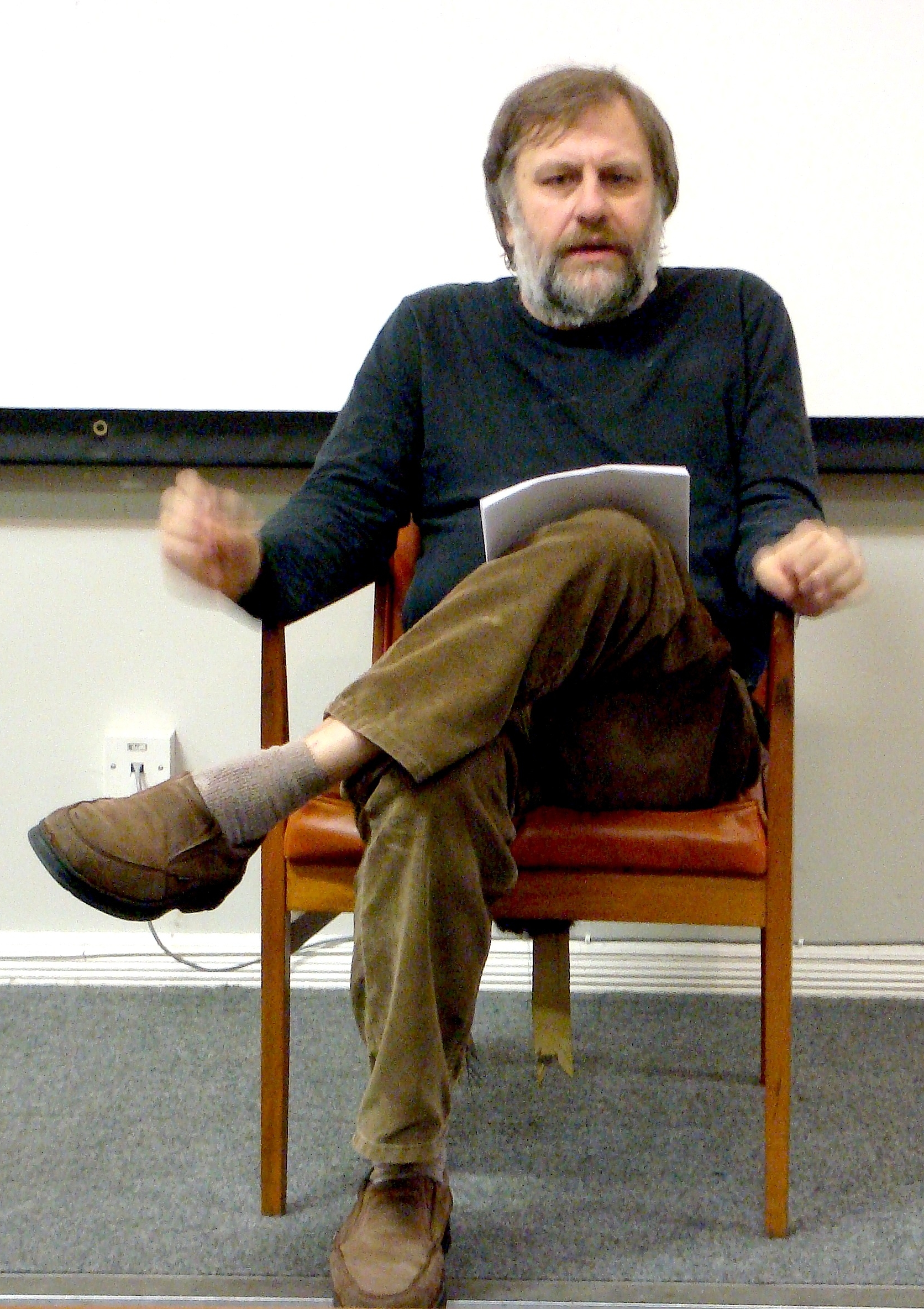“We feel free because we lack the very language to articulate our unfreedom.”
"Introduction: The Missing Ink", in Welcome to the Desert of the Real!: Five Essays on September 11 and Related Dates (2002), p. 2
Slavoj Žižek is a Slovenian continental philosopher. He is a professor at the Institute for Sociology and Philosophy at the University of Ljubljana and international director of the Birkbeck Institute for the Humanities of the University of London. He works in subjects including continental philosophy, political theory, cultural studies, psychoanalysis, film criticism, Marxism, Hegelianism and theology.
In 1989, Žižek published his first English text, The Sublime Object of Ideology, in which he departed from traditional Marxist theory to develop a materialist conception of ideology that drew heavily on Lacanian psychoanalysis and Hegelian idealism. His early theoretical work became increasingly eclectic and political in the 1990s, dealing frequently in the critical analysis of disparate forms of popular culture and making him a popular figure of the academic left. A critic of capitalism, neoliberalism and political correctness, Žižek calls himself a political radical, and his work has been characterized as challenging orthodoxies of both the political right and the social-liberal universities.Žižek's idiosyncratic style, popular academic works, frequent magazine op-eds, and critical assimilation of high and low culture have gained him international influence, controversy, criticism and a substantial audience outside academe. In 2012, Foreign Policy listed Žižek on its list of Top 100 Global Thinkers, calling him "a celebrity philosopher" while elsewhere he has been dubbed the "Elvis of cultural theory" and "the most dangerous philosopher in the West". Žižek's work was chronicled in a 2005 documentary film entitled Zizek! A scholarly journal, the International Journal of Žižek Studies, was founded to engage his work.

“We feel free because we lack the very language to articulate our unfreedom.”
"Introduction: The Missing Ink", in Welcome to the Desert of the Real!: Five Essays on September 11 and Related Dates (2002), p. 2
Lecture "Year of Distraction" http://www.youtube.com/watch?v=ChWXYNxUFdc, at 1:07.
Interview in HARDtalk, BBC World Service (12 January 2010)
Zdroj: Less Than Nothing (2012), Chapter One (The Drink Before), Vacillating The Semblances
Kontext: The implicit lesson of Plato is not that everything is appearance, that it is not possible to draw a clear line of separation between appearance and reality (that would have meant the victory of Sophism), but that essence is "appearance as appearance,"that essence appears in contrast to appearance within appearance; that the distinction between appearance and essence has to be inscribed into appearance itself. Insofar as the gap between essence and appearance is inherent to appearance, in other words, infsofar as essence is nothing but appearance reflected into itself, appearance is appearance against the background of nothing - everything appears ultimately out of nothing.
Zdroj: The Sublime Object of Ideology (1989), p.33, Idea's Appearing
that is, the lack in the Other.
148
The Sublime Object of Ideology (1989)
Conversations with Žižek by Slavoj Žižek and Glyn Daly (Cambridge: Polity Press, 2004), p. 45
Zdroj: Less Than Nothing (2012), Chapter Two, The Thing Itself: Hegel, pp. 200
First as Tragedy, Then as Farce (2009)
that's a MacGuffin, a pure nothing which is non the less efficient... what Lacan calls object petit a: a pure void which functions as the object cause of desire.
183
The Sublime Object of Ideology (1989)
“Prohibition of desire leads to desire for prohibition.”
Zdroj: Slavoj Žižek: Wokeness, Psychoanalysis, and Quantum Mechanics | Robinson's Podcast. https://www.youtube.com/watch?v=IxmZ4AVac7U
“What cannot be described should be inscribed into the artistic form as its uncanny distortion.”
Zdroj: Less Than Nothing (2012), Chapter One (The Drink Before), Vacillating The Semblances
Kontext: The horror of the Holocaust cannot be represented; but this excess of represented content over its aesthetic representation has to infect the aesthetic form itself. What cannot be described should be inscribed into the artistic form as its uncanny distortion.
Anecdote about the Soviet suppression of the Prague Spring in 1968, quoted in The New Yorker (5 May 2003), p. 39 http://books.google.com/books?id=AZQeAQAAMAAJ&q=%22cakes+and+watching+Russian+tanks+against+demonstrators.+It+was+perfect%22&dq=%22cakes+and+watching+Russian+tanks+against+demonstrators.+It+was+perfect%22&hl=en&ei=3HRhTpzzPIrv0gGwiazpDw&sa=X&oi=book_result&ct=result&resnum=1&ved=0CCoQ6AEwAA
Zdroj: The Sublime Object of Ideology (1989), pp.27, "Totalitarian Laughter"
Reverberations 2. Reverberations of the Crisis in a Multi-Centric World
Living in the End Times (2010)